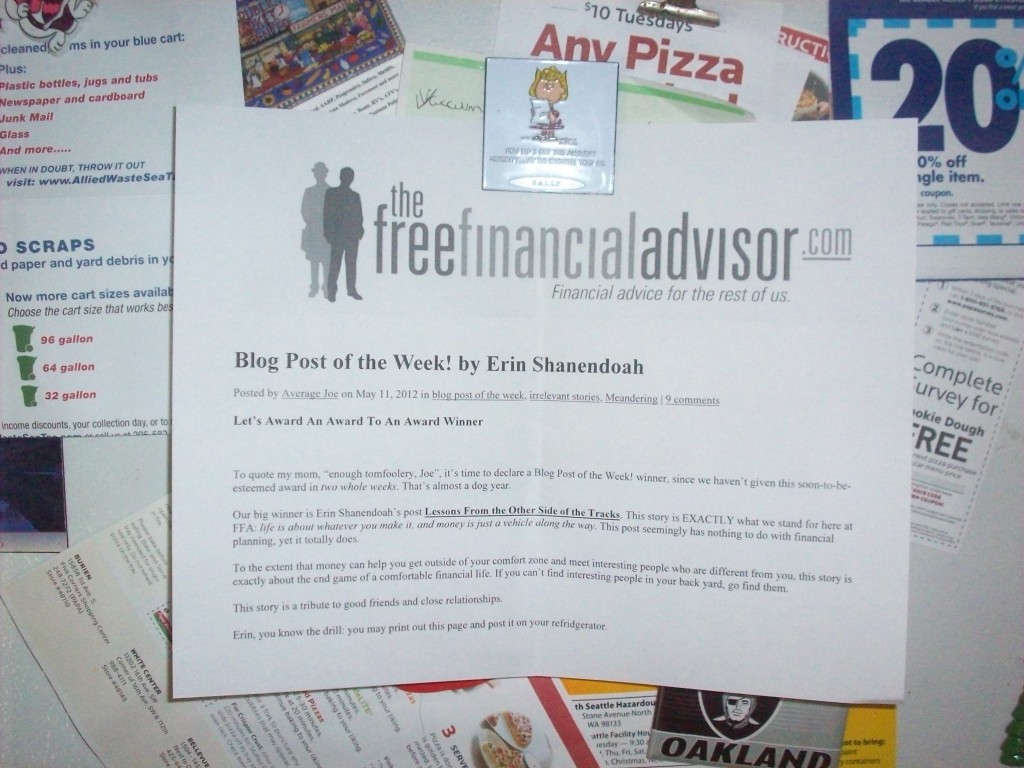Why I Am Writing This
Late last June, a few weeks before I joined Yakezie, and right about the time we were receiving the last of C’s unemployment checks, I wrote In Defense of 99 Weeks of Unemployment. It was not a subject I really expected to revisit, but even though the unemployment rate and votes for emergency extensions of unemployment benefits are no longer part of the daily news cycle, it is still something that is obviously on people’s minds. In mid March, Funancials wrote Are the Unemployed Employable?. Later that month, Financial Samurai published a post written by his friend Rachel about What’s It Like Being Unemployed?
That post got 26 comments (not including replies), most of them nice, because Rachel gave an honest view of what it was like and because her story said what the readers wanted to hear. Despite receiving enough in benefits that her net income was not reduced and she experpienced no financial hardship, Rachel’s view of being unemployed matched what the readers themselves remembered from earlier bouts of unemployment, which means it fit what they perceived the “proper” reaction to unemployment should be.
Late last week, Sam posted a second article on the subject- The Best States for Unemployment: Would You Work If You Could Make $1,800 A Month Doing Nothing? Besides listing the ten states with the best unemployment benefits, this article featured the story of Julie, another friend of Sam’s (told in Sam’s words, though, not her own), who is reacting to unemployment in a way the readers do NOT approve of. It also reinforced their belief that all people who have received the full 99 weeks of unemployment were simply living it up on the government’s dime. That post is currently sitting at 24 comments (not including replies), most of them not nice, some of them down right diatribes.
Why I Do Not Think Julie is Evil, Cheating the System, or Behaving Unethically
I want to start by telling people that most of those on unemployment are much more like Rachel than they are like Julie. In fact, I would bet that, despite the entitlement attitude Sam presents Julie as having, Julie is much more like Rachel than she is like the picture painted in Sam’s post.
Why do I think this? Because I have seen the positive face the long term unemployed try to put on their position. Julie has been unemployed for over a year now. She is one of the lucky ones, who had a good job beforehand, and a family wealthy enough to help support her during this time. Yes, she’s selling her artwork under the table via Facebook and not reporting it. Guess what? She would be doing that if she had a job, too. Yes, she is going on a vacation while on unemployment. It is a vacation she can afford, and she is not trying to cheat the system. She tried to contact the unemployment office, and when she could not, came up with a plan to still file her weekly “claims”, correctly stating that she was NOT available and looking for work during those weeks.
Per Sam, Julie claims she is holding out for the perfect job, but has she actually turned down any offers? Since she is being honest about everything else, I have a hard time believing she has received a job offer and turned it down. Doing that does cause a person to lose their benefits. More likely, Julie is looking for another design job. That is logical. It is what she was doing before. It is what she is trained in. It is, in fact, exactly what the state unemployment office wants her to be looking for.
I can not speak specifically to California unemployment laws, but if it works anything like Washington, I can tell you that they do not want designers applying for admin jobs. They do not want former managers applying for entry level positions. They want people applying for appropriate positions based on their skills, training, and experience level. When C got audited by the unemployment office, that was one of the things they were specifically checking for.
In Washington, you are expected to make three job contacts a week. For most people, that means a minimum of three job applications per week, but it is not written that way specifically because for some jobs, there just are not going to be three job openings in a week. In those cases (and I would expect a specialized position like Julie’s former one falls into this category), they are asked to reach out to companies that might have that kind of position, or talk to their contacts and networks.
However you parse it though, getting three job contacts a week, whether it is phone calls to a company or sending in applications, does not take that much time. It leaves people on unemployment with a lot of time on their hands. Julie has chosen to spend that time doing things she enjoys, keeping herself happy and her feelings of self-esteem and self-worth high.
I actually think that bugs a lot of people. They want the long term unemployed to feel worthless, to feel like they are maggots feeding off a dying system. I think the idea is that if someone feels worthless without a job, they will work harder to get a job. We believe depression is the appropriate response to being affected by an economic depression/recession.
I can tell you from much experience, people who are depressed, who feel worthless, do not look harder for a job. In fact, they stop looking altogether, because they do not feel like getting a job is even within their grasp anymore. In addition, depressed people are actually less likely to get hired. Think about it- all interviewers look at attitude, which attitude would you rather have in your office?
Using the System the Way it was Built to be Used is not Fraud, Waste, or Abuse
Julie is not responsible for the system she finds herself in. Unemployment is determined differently by each state. It is not her fault that some people are unable to collect unemployment despite having paid into it. It is not her fault that our government views small business owners differently than it does employees of any sort. That is one of the risks that small business owners take on (and should be aware of) when they go into business for themselves.
We do not means test those receiving unemployment. We place a limit on how much any single person can collect each week and over time, but we do not require them to disclose their savings and investments in order to qualify. We do not ask them their family’s financial situation and if they will be receiving monetary support from that family. That is not the way unemployment is built.
People are not abusing unemployment by taking the money even when they do not need it. Fraud, waste, and abuse laws are very specific. They require people to be lying to the system and taking advantage of loopholes that make the system work in a way it was not intended. Using the system exactly as it was built, as it was intended to work, is not abusing it.
People on unemployment are allowed to take vacations, as long as they properly report that they are not looking for work during that time. We cancelled a vacation we had planned, not because of unemployment, but because C was actually temporarily employed at the time, working for the Census. Taking the vacation would have resulted in him losing the Census job and therefore unemployment because it would have been tantamount to him turning down a job offer. But if he had not been working, yes, we would have taken the vacation and simply not collected unemployment for those weeks.
You can think we abused the system because after a year, we did not “need” unemployment to get by, though it would have been very tight. After 15 months of unemployment, I got a new job, with a 33% raise, and then, we did not even need unemployment to live comfortably. We still took it. And we used that money to pay down debt and to build up savings.
The last 6 months C was on unemployment, we both secretly hoped that he would not get a job. We had put together a new plan. But he still looked for work. He still applied for jobs- and not just three a week. Even slow weeks, he applied for around ten jobs.
For us, unemployment worked exactly as it was supposed to. It was a safety net that allowed us to meet our financial obligations when we experienced a sudden loss of income. The 26 months we received benefits (stretched out by the Census work) gave us the chance to build our own safety net.
We are among the lucky ones, different than Julie, but lucky none the less. We came out of unemployment financially better off than when we went in. There is no way that would have been possible without unemployment, or with even 6 months of unemployment. We needed a full year at the least.
I think it is also important to mention here that 99 weeks of unemployment is not the standard. Everyone who gets laid off does not automatically qualify for 99 weeks of unemployment. The standard is about 25 weeks of unemployment (roughly 6 months). The 99 weeks came from emergency systems that are in place for when state and federal unemployment rates get too high. As of September of 2011, no one in Washington state is eligible for 99 weeks of unemployment anymore because our state unemployment rate dropped below 9%.
The 99 weeks system has been in place in our country for years and years, but no one ever thought about it because we were not in the emergency position to need it. However, it worked exactly as it was intended to, giving extra support to laid off workers at a time when our economy was losing jobs at record rates.
Only People Who Are Lazy Are Unemployed
This is probably the thing that bugs me the most when I see it- the assumption people make that because when they were unemployed back in early 2002 (post 9/11 recession) it did not take them more than a few months to get a new job, anyone currently unemployed longer than they were must be lazy, must be taking advantage of the system and not looking for work.
In January of 2002, unemployment in Washingtonstate was at 7.4%, the highest it had been since 1993. When C got laid off in May 2009, it was at 9.4%. It went up to 10.2% in the first quarter of 2010. It has been slowly dropping off since then, but it took until September 2011 before it got back down to 9%, and as of March 2012, it was sitting at 8.3%. (Numbers courtesy of Google.)
It is hard to get a job when that many people are looking for work. And remember, C dropped off the official rolls of the unemployed in July 2011 when he stopped receiving benefits. How many more people are like him?
California is an even starker picture than Washington. January 2002 saw an unemployment rate of 6.5%, which was nothing compared to their 1993 rate of 9.8%. But by May 2009, it was up to 11.2%. It peaked at 12.4% a couple times in 2010, and even as of March 2012, the unemployment rate in California is sitting at 11%. (Numbers again courtesy of Google.)
How easy do you really think it is to find work when roughly 1/10 of the people in California are looking for jobs?
The job search site maintained by the state employment office here in Washington told you how many people had viewed a job. Some jobs were looked at upwards of 1,000 times. No, not all of those views turned into applications, but still, when, within 8 hours of a job being posted, if it was looked at 1,000 times, how many applications do you think that amounted to?
I ended up with the theory that if you did not see a job posting within the first hour of it going up, or if you were not in the first 200 applications that arrived, your resume was probably not even looked at.
I have said before and I will say again- in 26 months of looking for work- actively looking for work, applying for anywhere from 10-50 jobs a week – C got two interviews. Stop and think about that. Two years, two interviews.
This was not because he was lazy. He got held over for a second round of Census work that he technically did not have the seniority to get because of his amazing work ethic and the quality of his work.
He was not interviewed because employers were not looking at his resume, or he was not what they wanted. He did not have a Bachelor’s degree, but he had 10+ years of experience. Employers decided that for the administration work he excelled at (he had been a sales administrator), they wanted people with BAs and no experience. They could pay them peanuts and treat them like crap.
Could he have been applying for retail positions, fast food, or sign holder on a street corner? I suppose, but anything that paid him less than unemployment would have put us in an even more precarious financial position, at least for the first year. And after that, we would not have needed the income, so why take a job from someone who really did need it?
Moving for a job for him certainly was not worth it, as I was (and am) the primary breadwinner, and my job was stable and provided good benefits. For a lot of people, moving for the possibility of a new job is not worth the risk of being that far away from their support networks, even if they do not have a family to think about.
Yes, some places, like North Dakota, have low unemployment rates for the moment. Having lived in eastern Montana for 13 years though, you really could not pay me enough to move back to that part of the country. And to go along with it, they are not hiring people like C or Julie. They are hiring 18-25 year old single young men to work in the oil fields. Just because someplace has a booming economy, that does not mean it has jobs for everyone.
It has also been demonstrated, over and over again, that employers prefer to hire those who are already employed. You would think that there would be benefits to hiring someone who could start tomorrow, instead of a person that has to give anywhere from two weeks to a month’s notice, but that just is not the case. Much like with animals in shelters and children in foster care, the majority of those currently unemployed ended up there through no fault of their own. They were laid off. Not having a job is not, in any way, a comment on their actual work ethic or abilities. And yet, again, just like animals in shelters and kids in foster care, society assumes they are there because they are damaged goods, that something must be wrong with them, otherwise, why would they be unemployed? The realities of the situation do not outweigh our long held prejudices, even if they are based on incorrect assumptions.
This is actually one of our reasons for C going back to school. When he starts applying for jobs again, he will have been a student for the last 5+ years (current estimates are that it will be 9 years total from when he went back to school full time to his PhD). Being a student is something that employers understand. It is a state of existing that makes sense to them. They know what a student has been doing (or at least assume they do), whereas they do not understand what an unemployed person could have been doing for all that time.
Last I heard, there was a plan to make it illegal to discriminate against people based on their employment status. That’s great, but just like you can always find a supposedly non-racist reason not to hire a person of color (I just don’t think they’ll be a good fit for our team), most employers will continue to prefer people who are currently employed over those who are not. Their natural reason will be that the employed person’s skills are more up to date.
No One Asked for This
Being a member of the long term unemployed is scary. It is depressing. It can destroy your mental and physical health. In our current economy (I do not care how much you hate that phrase, it is different than it has been at any previous time in my working life), being unemployed is rarely a commentary on the worker. It is simply a matter of fact for close to 10% of our adult population. We need to stop judging those who are unemployed; we need to stop questioning their motives; we need to stop vilifying those who are simply looking for the job that matches their training, skills, and experience. Unemployment has a few million different looks right now. Just because it does not look the way you think it should, does not mean the person (or people) is behaving illegally or even unethically.
Yes, some people are. Some people always are. That’s a fact of the human condition. But I do not assume every college fraternity member is a rapist, or even a sexist pig, despite the fact that some of them are. We need to not judge any group by the worst among them, because then, none of us would be spared.









